-
ORIGINAL ARTICLE12-16-2024
Construction and validation of an educational game on biosafety in the central sterile supply department
Revista Brasileira de Enfermagem. 2024;77(6):e20230478
Abstract
ORIGINAL ARTICLEConstruction and validation of an educational game on biosafety in the central sterile supply department
Revista Brasileira de Enfermagem. 2024;77(6):e20230478
DOI 10.1590/0034-7167-2023-0478
Views0See moreABSTRACT
Objectives:
to construct and validate an educational game on biosafety in the Central Sterile Supply Department of a hospital in Curitiba, PR.
Methods:
the study was conducted using a quantitative approach, employing applied and technological research with an exploratory design. The process was divided into six stages, from the definition of the theme to the validation and application of the game. The study was carried out from May to August 2022, involving 17 nursing professionals from a Central Sterile Supply Department during day and night shifts, as well as 9 judges.
Results:
the study resulted in the construction of a board game named by the authors as “My Health First.”
Conclusions:
the research achieved its objective of constructing and validating an educational game. By reflecting on professional practice and correlating the occupational risks present, the professionals were able to list safe actions, identify problems, and seek solutions.

-
ORIGINAL ARTICLE12-16-2024
Health literacy development of Primary Health Care patients: qualitative research
Revista Brasileira de Enfermagem. 2024;77(6):e20240154
Abstract
ORIGINAL ARTICLEHealth literacy development of Primary Health Care patients: qualitative research
Revista Brasileira de Enfermagem. 2024;77(6):e20240154
DOI 10.1590/0034-7167-2024-0154
Views0See moreABSTRACT
Objectives:
to identify the process of health literacy development among primary care patients, relating it to their self-care practices.
Methods:
qualitative, prospective research with 22 patients from two Family Health Strategy units. Data were obtained through individual semi-structured interviews, examined through descriptive statistics and thematic content analysis.
Results:
the results discuss how participants learn about health and how this resonates in their behaviors, culminating in two thematic categories: “Health knowledge construction”; and “Dialogue between health knowledge construction and patient care actions”.
Final Considerations:
health knowledge is developed mainly through interpersonal relationships, mediated by health professionals through bonding and communication. Community educational actions and training of health professionals in communication can promote health literacy and self-care among patients.

-
ORIGINAL ARTICLE12-16-2024
Analysis of omission of antimicrobial doses in Intensive Care Units
Revista Brasileira de Enfermagem. 2024;77(6):e20240102
Abstract
ORIGINAL ARTICLEAnalysis of omission of antimicrobial doses in Intensive Care Units
Revista Brasileira de Enfermagem. 2024;77(6):e20240102
DOI 10.1590/0034-7167-2024-0102
Views0See moreABSTRACT
Objectives:
to analyze the rate of antimicrobial dose omission in intensive care units.
Methods:
cross-sectional study carried out between March 1 and September 30, 2023, in intensive care units of a University Hospital in Rio de Janeiro.
Results:
the sample consisted of 452 prescriptions and 1467 antimicrobial doses. The dose omission rate was 4.29%. Each antimicrobial prescribed increased the chance of omission by 51%. The strategy of double-checking prescriptions helped prevent 30% of antimicrobial dose omissions (p=0.0001).
Conclusions:
monitoring the omission of antimicrobial doses can guide nursing actions to improve quality and patient safety, contributing to the prevention of medication errors, antimicrobial stewardship and the fight against antimicrobial resistance.
-
REVIEW12-16-2024
Recommendations for guidelines for promoting mental health in the workplace: an umbrella review
Revista Brasileira de Enfermagem. 2024;77(6):e20240086
Abstract
REVIEWRecommendations for guidelines for promoting mental health in the workplace: an umbrella review
Revista Brasileira de Enfermagem. 2024;77(6):e20240086
DOI 10.1590/0034-7167-2024-0086
Views1See moreABSTRACT
Objectives:
to summarize the recommendations of guidelines for promoting mental health in the workplace.
Methods:
an umbrella review, according to Joanna Briggs Institute and Preferred Reporting Items for Systematic reviews and Meta-Analyses methodological assumptions. Data collection was carried out in January 2021 and updated in July 2023 in the American Psychological Association, Cochrane Library, EMBASE, National Library of Medicine, and Scopus databases. Systematic reviews that assessed guidelines with recommendations for mental health care for workers were included. PROSPERO registration CRD42023461845.
Results:
four systematic reviews published between 2015 and 2018 were identified. The abstracts highlighted actions that facilitate and inhibit the recommendations as well as three categories of intervention: primary prevention – worker protection; secondary prevention – promoting workers’ mental health; and tertiary prevention – supporting, monitoring and rehabilitating workers upon returning to work.
Conclusions:
the interventions are based on prevention, promotion and early recognition, support and rehabilitation of mental health problems.

-
ORIGINAL ARTICLE12-16-2024
Psychometric analysis of ProQOL-BR in nursing: building hospital safety and protection
Revista Brasileira de Enfermagem. 2024;77(6):e20240085
Abstract
ORIGINAL ARTICLEPsychometric analysis of ProQOL-BR in nursing: building hospital safety and protection
Revista Brasileira de Enfermagem. 2024;77(6):e20240085
DOI 10.1590/0034-7167-2024-0085
Views0See moreABSTRACT
Objectives:
to analyze the psychometric properties of the ProQOL-BR instrument in hospital nursing professionals.
Methods:
a methodological study to validate the ProQOL-BR. Confirmatory factor analysis, assessment of local and global adjustment quality, Pearson hypothesis testing and Cronbach’s alpha internal consistency analysis were used.
Results:
a total of 490 professionals participated. The model presents adequate quality due to factor weights (λ≥ 0.40), acceptable overall fit quality and adequate chi-square ratio and degrees of freedom (χ2/g.1=2.51) for the parameters of CFI (0.923), GFI (0.902), TLI (0.914) and RMSEA (0.042). In terms of validity, it was shown to be adequate with CC=0.89. The internal consistency obtained by standardized Cronbach’s alpha was 0.761. Criterion validity was shown to be favorable with significant correlations (0.001).
Conclusions:
the instrument was validated regarding content, criteria and reliability. Three questions were removed from the original instrument, ProQOL-BR, leaving the final instrument with 25 questions.

-
12-16-2024
GerenciaDOR™: development of digital technology by nurses for the assessment of patients with chronic pain
Revista Brasileira de Enfermagem. 2024;77(6):e20240050
Abstract
GerenciaDOR™: development of digital technology by nurses for the assessment of patients with chronic pain
Revista Brasileira de Enfermagem. 2024;77(6):e20240050
DOI 10.1590/0034-7167-2024-0050
Views0See moreABSTRACT
Objectives:
to develop a digital technological solution (prototype) for assessing patients with chronic pain.
Methods:
this is a methodological and technological development study based on the Human-Centered Design framework and the principles of Patient-Centered Care. The prototype guides patients through a body diagram and directs them to an evaluation using specific instruments that address the multidimensional aspects of chronic pain.
Results:
the GerenciaDOR* project enables navigation through the Web App screens, providing access to pain assessment features up to the presentation of results.
Final Considerations:
the study describes a systematic approach to pain assessment and expands nurses’ knowledge in pain management. Additionally, it can promote the development of other digital technologies for chronic pain assessment and contribute to a multidisciplinary, patient centered treatment.

-
ORIGINAL ARTICLE12-16-2024
Respectful care for postpartum women with sickle cell disease: a netnographic study
Revista Brasileira de Enfermagem. 2024;77(6):e20230545
Abstract
ORIGINAL ARTICLERespectful care for postpartum women with sickle cell disease: a netnographic study
Revista Brasileira de Enfermagem. 2024;77(6):e20230545
DOI 10.1590/0034-7167-2023-0545
Views1See moreABSTRACT
Objectives:
to analyze principles of respectful maternity care in narratives of postpartum women with sickle cell disease, relating them to Sustainable Development Goals.
Methods:
netnographic study, with two videos published in 2020. Deductive iconographic and thematic analysis by Respectful Maternity Care Charter, organized in MAXQDA.
Results:
principles identified were the right to: freedom from harm and ill-treatment; information, informed consent, refusal of medical procedures, and respect for their choices and preferences including companion; be considered a person from birth, with dignified and respectful treatment; health at the highest possible level; newborns being with their parents or guardians. The Sustainable Development Goals for women by 2030 were not positively contemplated in postpartum women’s experience.
Final Considerations:
it is appropriate that health workers qualify themselves to provide respectful maternity care, with qualified listening, understanding, and resolution of unique demands of postpartum women with sickle cell disease, seeking equality in care for women.

-
REVIEW12-16-2024
Strategies for expanding vaccination coverage in children in Brazil: systematic literature review
Revista Brasileira de Enfermagem. 2024;77(6):e20230343
Abstract
REVIEWStrategies for expanding vaccination coverage in children in Brazil: systematic literature review
Revista Brasileira de Enfermagem. 2024;77(6):e20230343
DOI 10.1590/0034-7167-2023-0343
Views1See moreABSTRACT
Objectives:
to identify the strategies found in the literature for increasing vaccination coverage among children in Brazil. It is justified mainly by the current scenario of falling vaccination coverage.
Methods:
systematic literature review. The search was carried out in the Pubmed (MEDLINE), Embase and Scopus databases, following the PRISMA guidelines.
Results:
initially, 4,824 results were returned. In the end, 6 studies were included for narrative synthesis using the SWiM methodology. Of these, 50% dealt with studies related to the Bolsa Família Program (PBF). The others explored strategies for approaching parents directly, Rapid Vaccination Monitoring (MRV) and the Community Health Agents Program (PACS). The PBF did not guarantee compliance with the conditionality of keeping vaccinations up to date. The MRV and PACS are effective strategies, especially because they allow active search for absentees.
Conclusions:
we conclude that more publications are needed on strategies to increase vaccination coverage among children in Brazil.

-
ORIGINAL ARTICLE11-10-2023
Construction and validity of educational technology in audiovisual media on premature newborn care
Revista Brasileira de Enfermagem. 2023;76:e20220403
Abstract
ORIGINAL ARTICLEConstruction and validity of educational technology in audiovisual media on premature newborn care
Revista Brasileira de Enfermagem. 2023;76:e20220403
DOI 10.1590/0034-7167-2022-0403
Views0See moreABSTRACT
Objectives:
to construct and validate an educational video storyboard about care for premature newborns at home.
Methods:
a methodological study, with the construction of an educational video storyboard, validated with 14 judges. Content was selected from scoping review. For data collection, a validated instrument was used. The criterion for validity was agreement greater than 80%, analyzed using the Content Validity Index.
Results:
the storyboard construction was guided by the Cognitive Theory of Multimedia Learning theoretical framework. Construction and validity took place from May to December 2020. The storyboard’s final version lasted 10 minutes, and was validated in terms of objective, structure, presentation and relevance, with a Content Validity Index of 0.9.
Conclusions:
the storyboard of the educational video proved to be valid and adequate for health promotion in developing care for premature newborns at home.

-
ORIGINAL ARTICLE12-08-2023
Early ambulation and dhikr complementary therapies effect on intestinal peristaltic in post-open cholecystectomy patients
Revista Brasileira de Enfermagem. 2023;76:e20220636
Abstract
ORIGINAL ARTICLEEarly ambulation and dhikr complementary therapies effect on intestinal peristaltic in post-open cholecystectomy patients
Revista Brasileira de Enfermagem. 2023;76:e20220636
DOI 10.1590/0034-7167-2022-0636
Views0ABSTRACT
Objectives:
to analyze and determine the effect of a combination intervention of early ambulation and dhikr therapy on intestinal peristaltic recovery in post-open cholecystectomy patients.
Methods:
a pre-experimental design with one group pre and post-test design was used. The samples were 15 post-open cholecystectomy patients which were selected using the purposive sampling technique. The data were collected using the instrument observation sheet and analyzed using the Wilcoxon test. Early ambulation used standard operational procedure in the hospital and dhikr therapy was carried out at 2 hours post-operation for 10-15 minutes.
Results:
there was an effect of early ambulation and dhikr therapy on intestinal peristaltic recovery in post-open cholecystectomy patients with general anesthesia (Z=-3.442; p=0.001).
Conclusions:
a combination of early ambulation and dhikr therapy can be recommended as interventions to improve intestinal peristaltic in a post-open cholecystectomy patient with general anesthesia.
Keywords:Anesthesia, GeneralCholecystectomyComplementary TherapiesEarly AmbulationPerioperative NursingSee more -
ORIGINAL ARTICLE11-13-2023
Educational technology on tuberculosis: construction shared with Primary Health Care nurses
Revista Brasileira de Enfermagem. 2023;76:e20230025
Abstract
ORIGINAL ARTICLEEducational technology on tuberculosis: construction shared with Primary Health Care nurses
Revista Brasileira de Enfermagem. 2023;76:e20230025
DOI 10.1590/0034-7167-2023-0025
Views0See moreABSTRACT
Objective:
to develop, in a participatory way, an educational technology to assist nurses in the management of tuberculosis cases in Primary Health Care.
Methods:
methodological research with a qualitative approach. Data were collected between June and October 2022, in 25 Basic Health Units, with 41 nurses interviewed individually. Thematic content analysis was carried out to guide technology elaboration.
Results:
three empirical categories were organized, demonstrating the facilities and difficulties in tuberculosis management, the conceptions about educational technology as a facilitator of the teaching-learning process in Primary Health Care and participatory development of technology. Nurses were in favor of constructing an instructional guide technology, and made suggestions to encourage its creation and use in daily service routine.
Final considerations:
the participatory process made it possible to create technology to assist nurses in the teaching-learning process in Primary Health Care about caring for people with tuberculosis.
-
07-31-2023
First graduate of the Master of Nursing in Advanced Practice in Oncology in Chile
Revista Brasileira de Enfermagem. 2023;76:e76suppl401
Abstract
First graduate of the Master of Nursing in Advanced Practice in Oncology in Chile
Revista Brasileira de Enfermagem. 2023;76:e76suppl401
DOI 10.1590/0034-7167.202376suppl401
Views0In 2020, the guidelines for Advanced Nursing Practice (APN) implementation() were published by the International Council of Nursing (ICN). On that occasion, I was invited to comment on the reality of specialist nurses in Chile, expressing the expectation of implementing an APN program, specifically Clinical Nurse Specialists (CNS). CNS are one of the most internationally […]See more -
ORIGINAL ARTICLE03-15-2024
Is there scientific relevance to the plot of films and documentaries about eating disorders?
Revista Brasileira de Enfermagem. 2024;77(1):e20220547
Abstract
ORIGINAL ARTICLEIs there scientific relevance to the plot of films and documentaries about eating disorders?
Revista Brasileira de Enfermagem. 2024;77(1):e20220547
DOI 10.1590/0034-7167-2022-0547
Views1See moreABSTRACT
Objectives:
to analyze films and documentaries about eating disorders from the last twenty years, identifying the way they approach the topic as well as their relevance for didactic use in teaching the health field.
Methods:
a descriptive study, whose data collection was carried out on the main streaming and video platforms, resulting in the survey of 60 media. Of these, only 25 had audio/subtitles in Portuguese (inclusion criteria). scientific relevance was analyzed considering psychopathological and epidemiological aspects of these disorders. A questionnaire about the plot, characters and descriptive data analysis were used.
Results:
most media were dramas about female teenagers who tried to conform to beauty stereotypes, whose symptoms portrayed converged with current medical diagnostic manuals.
Conclusions:
in practical terms, a classificatory list of 11 media was prepared that could be used as a teaching resource for teaching this topic in the health field.

-
ORIGINAL ARTICLE02-26-2024
Technological prospecting of patents related to monitoring accidents due to falls in hospitals
Revista Brasileira de Enfermagem. 2024;77(1):e20230084
Abstract
ORIGINAL ARTICLETechnological prospecting of patents related to monitoring accidents due to falls in hospitals
Revista Brasileira de Enfermagem. 2024;77(1):e20230084
DOI 10.1590/0034-7167-2023-0084
Views0See moreABSTRACT
Objectives:
to map the production of technologies aimed at monitoring falls in a hospital environment protected by registered patents.
Methods:
a technological prospecting of international patents, with a quantitative approach, with search carried out between February and March 2022 in the Derwent Innovations Index database with descriptors fall, hospital, monitoring.
Results:
212 patents were found, with the majority filed and published since 2010, by Tran B (9) and Cerner Innovation Inc (9), focused on health technology. Universities were responsible for 13% of deposits. There was a predominance of records from the United States (43.4%), China (21.7%) and Japan (12.3%), in addition to technological strategies classified as devices for the environment (80.7%) and for preventing falls (66.5%) as well as trend towards resources with multiple functionalities in the same technology.
Conclusions:
the plurality of functions in the same device reflects the search for optimizing resources and the concern with comprehensive care.
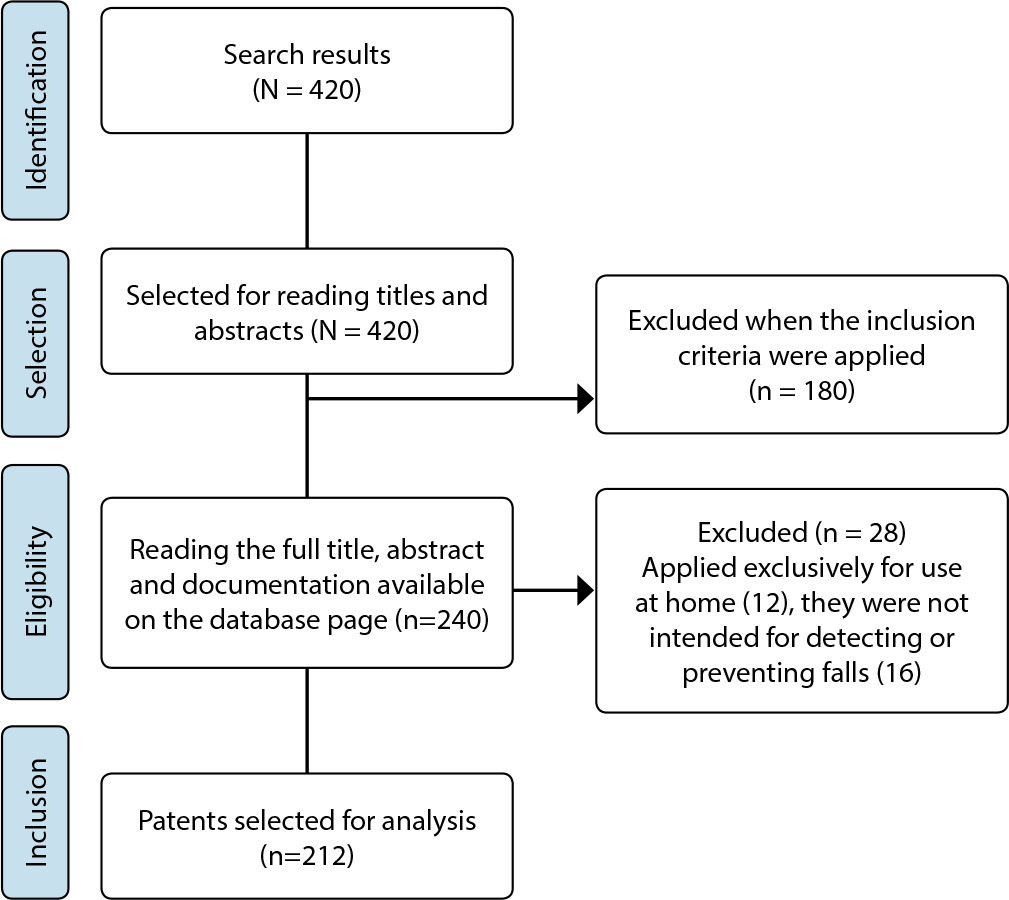
-
REVIEW03-15-2024
Use of podcasts for health education: a scoping review
Revista Brasileira de Enfermagem. 2024;77(1):e20230096
Abstract
REVIEWUse of podcasts for health education: a scoping review
Revista Brasileira de Enfermagem. 2024;77(1):e20230096
DOI 10.1590/0034-7167-2023-0096
Views0See moreABSTRACT
Objectives:
to map the scientific evidence related to the characteristics, themes, and outcomes of using health education podcasts aimed at individuals over 18 years of age in intra or extrahospital environments.
Methods:
a scoping review, based on the Joanna Briggs Institute method, conducted in 11 databases, including studies from 2004 to 2022.
Results:
11 studies were selected, categorized, highlighting the characteristics, evaluated outcomes, areas, and conditions of podcast application, indicating it as an effective tool for promoting behavioral change, health promotion, and social interaction, demonstrating its potential to improve well-being, quality of life, and user/client autonomy.
Conclusions:
the use of podcasts proves to be an effective, innovative, and low-cost tool, with a significant social impact, being effective for behavioral change, satisfaction, and social interaction. However, the lack of comprehensive studies on podcast development methodologies represents challenges to be overcome.

-
ORIGINAL ARTICLE03-15-2024
Health Management of an HIV Testing and Counseling Center: Nursing Contributions
Revista Brasileira de Enfermagem. 2024;77(1):e20230217
Abstract
ORIGINAL ARTICLEHealth Management of an HIV Testing and Counseling Center: Nursing Contributions
Revista Brasileira de Enfermagem. 2024;77(1):e20230217
DOI 10.1590/0034-7167-2023-0217
Views0See moreABSTRACT
Objectives:
to analyze the role of nursing in the establishment of an HIV/AIDS Testing and Counseling Center in a Brazilian municipality.
Methods:
a historical study utilizing primary sources, including documents and oral accounts, involving a total of ten participants. The study encompasses the years 1997 and 1998. The research took place at the Testing and Counseling Center in São João de Meriti. Data was collected from March to May 2022.
Results:
nursing made significant contributions through the development of training initiatives led by nurses, who were also responsible for individual and group counseling, as well as HIV testing requests.
Final Considerations:
nursing played a crucial role in the center and in the management of Sexually Transmitted Infections, being involved in all stages of treatment in accordance with current public health policy.
-
ORIGINAL ARTICLE07-08-2020
Spirituality and religiousity in the experience of suffering, guilt, and death of the elderly with cancer
Revista Brasileira de Enfermagem. 2020;73:e20190034
Abstract
ORIGINAL ARTICLESpirituality and religiousity in the experience of suffering, guilt, and death of the elderly with cancer
Revista Brasileira de Enfermagem. 2020;73:e20190034
DOI 10.1590/0034-7167-2019-0034
Views0See moreABSTRACT
Objective:
to understand spirituality and religiosity in the experience of suffering, guilt, and death of the elderly with cancer.
Method:
qualitative research based on Viktor Frankl’s Existential Analysis. Twenty phenomenological interviews were conducted with people over 60 years old undergoing chemotherapy treatment at an oncology unit of a hospital in the city of Salvador, Bahia State, Brazil, between August and October 2018.
Results:
the following categories emerged: Experiences spirituality and religiosity in the face of the tragic triad and existential emptiness; Uses spirituality/religiosity as resilience strategies. After apprehension of ontic aspects, it was possible the ontological understanding of spirituality and religiosity in the face of suffering, guilt, and death experienced in the elderly with cancer’s daily life.
Final considerations:
spirituality and religiosity were understood as coping strategies used in the unstable experience of the elderly with cancer, providing comfort and resilience.
-
ORIGINAL ARTICLE09-16-2019
Depression, self-concept, future expectations and hope of people with HIV
Revista Brasileira de Enfermagem. 2019;72(5):1288-1294
Abstract
ORIGINAL ARTICLEDepression, self-concept, future expectations and hope of people with HIV
Revista Brasileira de Enfermagem. 2019;72(5):1288-1294
DOI 10.1590/0034-7167-2018-0730
Views0See moreABSTRACT
Objective:
To analyze conditions of depression, self-concept, future expectations and hope in people with HIV/AIDS.
Method:
Cross-sectional survey of 108 individuals living with HIV/AIDS, carried out in a reference hospital for the treatment of infectious diseases in Northeast Brazil. The following instruments were employed: sociodemographic data, and questionnaires for ascertaining participants’ emotions, including scales for self-concept, hope, depression (HAMD-D), and future expectations. Descriptive statistics using the following tests were performed: Mann–Whitney, Kruskal–Wallis, chi-square, and t-test—considered significant when p ≤ 0.05.
Results:
31.5% presented mild depression and 21.3% presented moderate depression; 63% reported difficulty in obtaining decent employment; 52.8% considered life a failure; 52.8% felt worthless. Fear, guilt and loneliness influenced self-concept (p ≤ 0.05). Loneliness influenced hope (p ≤ 0.05).
Conclusion:
It is necessary to raise the attention of nursing professionals and healthcare managers to the importance of providing health services that consider the mental health of people with HIV/AIDS, contributing to treatment adherence and well-being.
-
ORIGINAL ARTICLE10-05-2020
Factors associated with the performance of episiotomy
Revista Brasileira de Enfermagem. 2020;73:e20190899
Abstract
ORIGINAL ARTICLEFactors associated with the performance of episiotomy
Revista Brasileira de Enfermagem. 2020;73:e20190899
DOI 10.1590/0034-7167-2019-0899
Views0See moreABSTRACT
Objective:
To analyze the factors associated with the performance of episiotomy.
Methods:
Cross-sectional study, developed with data from the research “Born in Belo Horizonte: Labor and birth survey, “conducted with 577 women who had their children via vaginal birth. In order to verify the magnitude of the association between episiotomy and its possible determinants, logistic regression models were constructed to estimate the odds ratio.
Results:
Episiotomy was performed in 26.34% of women, and 59.21% knew they had been subjected to it. We observed that younger women, primiparous women, women assisted by a professional other than the obstetric nurse and women who had their babies in a private hospital have an increased chance of being submitted to this procedure.
Conclusion:
Considering the rates of episiotomy, this study highlights the need for the absolute contraindication to indiscriminate performing it.
-
ORIGINAL ARTICLE12-13-2019
Obstetric Nursing in best practices of labor and delivery care
Revista Brasileira de Enfermagem. 2019;72:235-242
Abstract
ORIGINAL ARTICLEObstetric Nursing in best practices of labor and delivery care
Revista Brasileira de Enfermagem. 2019;72:235-242
DOI 10.1590/0034-7167-2018-0561
Views0See moreABSTRACT
Objective:
to evaluate the association of Obstetric Nursing in the best practices of delivery and birth care in maternity hospitals.
Method:
a cross-sectional study, with 666 women selected for delivery. Parturition obstetric practices performed by professionals were categorized into: clearly useful practices that should be encouraged, practices that are clearly harmful or ineffective and that should be eliminated and practices used inappropriately at the time of parturition.
Results:
clearly useful practices were used in greater proportions in the hospitals that had Obstetric Nursing working, while clearly harmful practices and those used inappropriately were practiced in smaller proportions in hospitals that had Obstetric Nursing, both with statistical difference.
Conclusion:
institutions with Obstetric Nursing adopt better practices of delivery and birth care, based on scientific evidence, when compared to those that do not act.
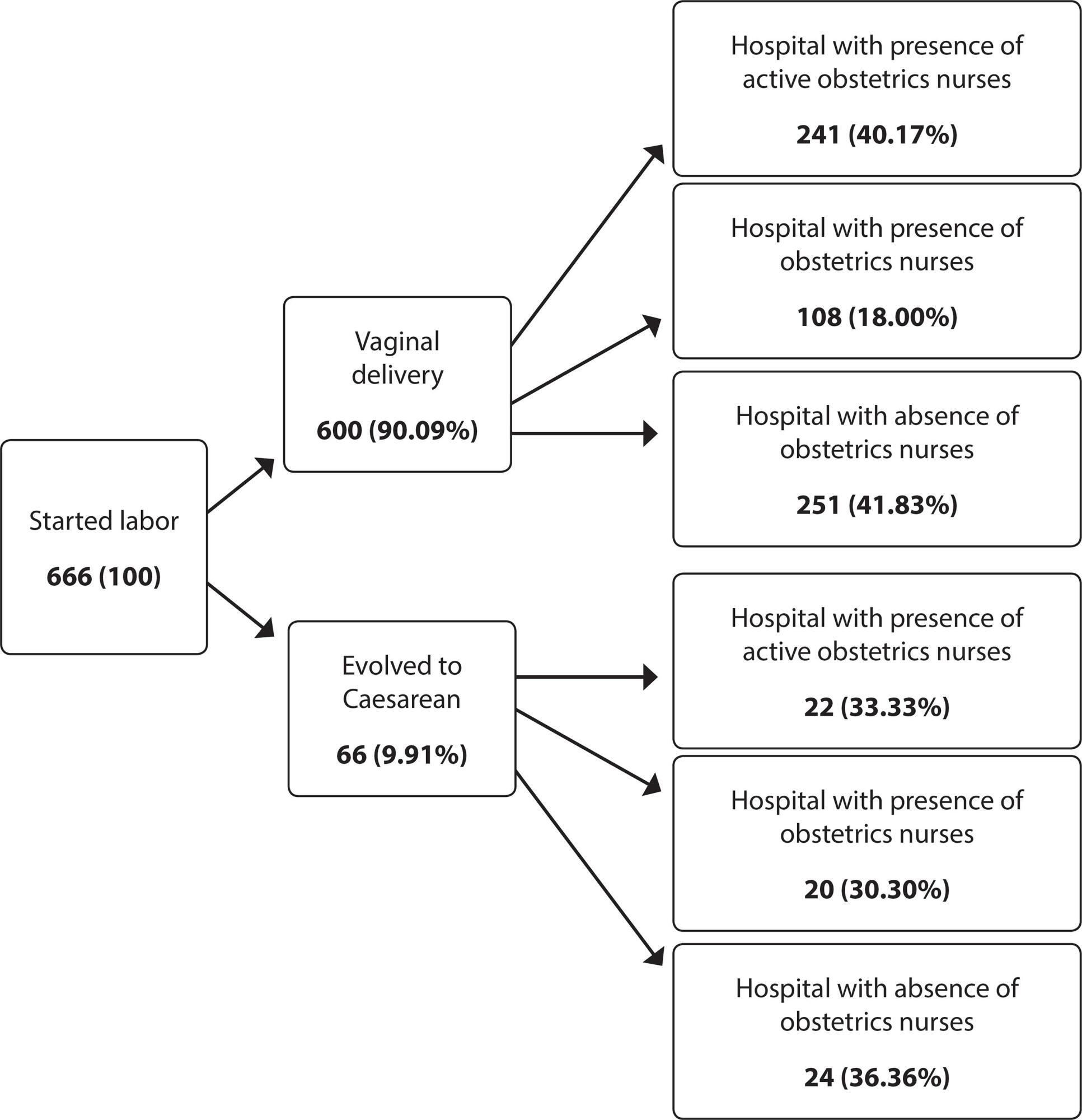
-
ORIGINAL ARTICLE09-16-2019
Temporal trend of leprosy in a region of high endemicity in the Brazilian Northeast
Revista Brasileira de Enfermagem. 2019;72(5):1356-1362
Abstract
ORIGINAL ARTICLETemporal trend of leprosy in a region of high endemicity in the Brazilian Northeast
Revista Brasileira de Enfermagem. 2019;72(5):1356-1362
DOI 10.1590/0034-7167-2018-0682
Views0See moreABSTRACT
Objective:
to analyze the temporal trend and epidemiological patterns of leprosy indicators in Sobral, a municipality countryside of the state of Ceará, from 2001 to 2016.
Method:
a time series study based on data from the Department of Informatics of the Unified Health System. The time trend analysis was performed using the join point regression model.
Results:
There were 2,220 new cases of leprosy in Sobral from 2001 to 2016. Of these, 158 (7.2%) in children younger than 15 years of age, the proportion of new male cases was 52.8% (1,162), cases with grade 2 were 7.0% (156), and proportion of cases diagnosed by contact examination 5.7% (126).
Final considerations:
leprosy remains hyperendemic in adults and children, demonstrating the character of neglected disease. Analysis of the temporal trend allowed to verify that the instability in the detection coefficients, reflect operational problems in the organization of the services
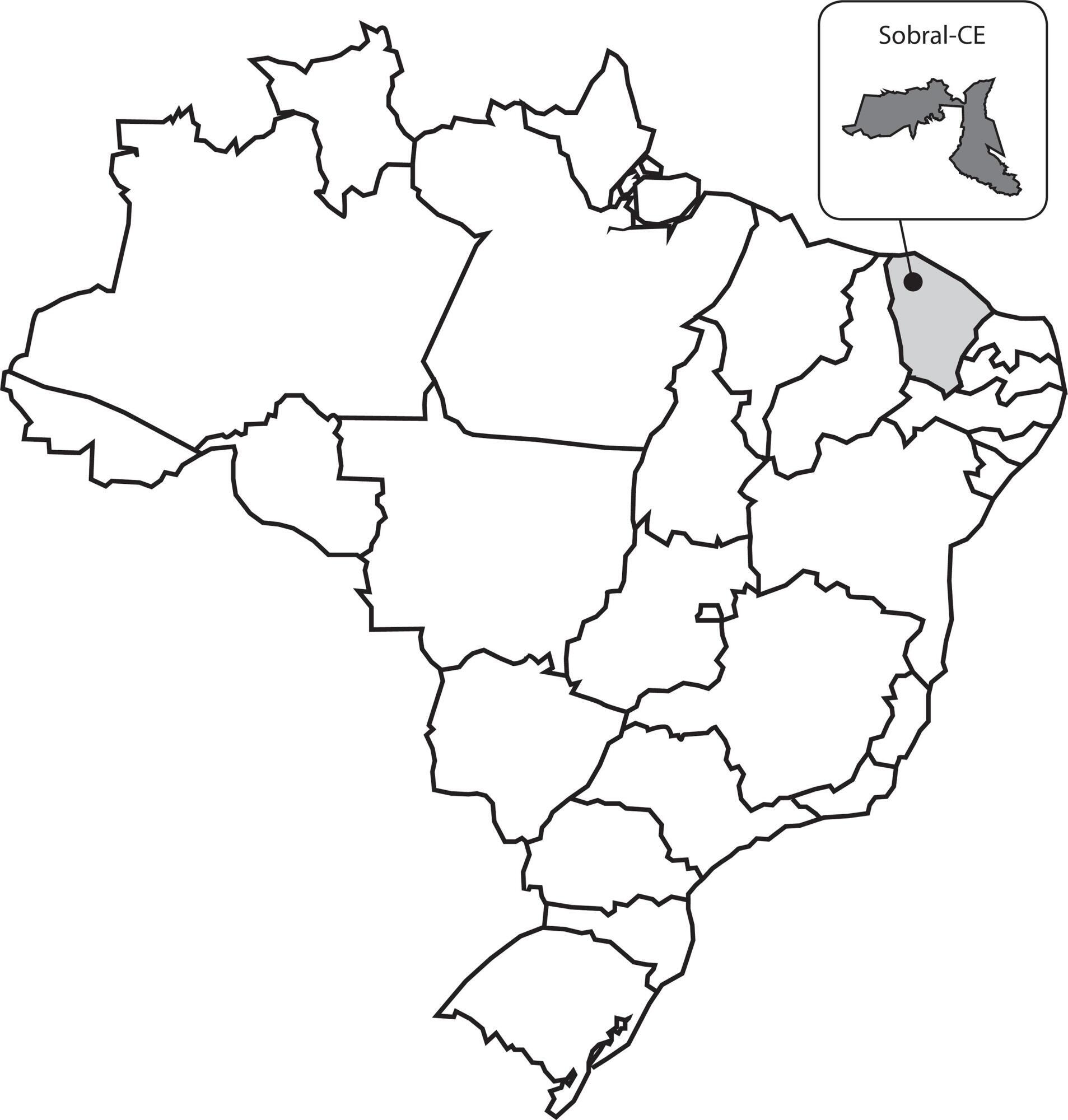
-
REVIEW08-20-2021
Assessment of patient safety culture in Brazilian hospitals through HSOPSC: a scoping review
Revista Brasileira de Enfermagem. 2021;74(6):e20201315
Abstract
REVIEWAssessment of patient safety culture in Brazilian hospitals through HSOPSC: a scoping review
Revista Brasileira de Enfermagem. 2021;74(6):e20201315
DOI 10.1590/0034-7167-2020-1315
Views0See moreABSTRACT
Objectives:
to describe, from literature, the characteristics of patient safety culture in Brazilian hospitals that applied the Hospital Survey on Patient Safety Culture.
Methods:
this is a scoping review. A search was performed in the databases LILACS, PubMed, SciELO, CINAHL, Web of Science, Scopus and in the CAPES Dissertations and Theses Database in September and October 2020.
Results:
thirty-six studies were identified. Nine studies identified strengthened areas such as: “teamwork within the units”, “expectations of supervisor/boss and actions promoting safety”, “organizational learning”, “support of hospital management for patient safety” and “frequency of report of events”. As a critical area, the dimension “non-punitive response to error” was evidenced in 30 of 36 studies.
Conclusions:
the identification of areas of strength and critical areas of safety culture is relevant to encourage improvement of patient safety problems in an institution.
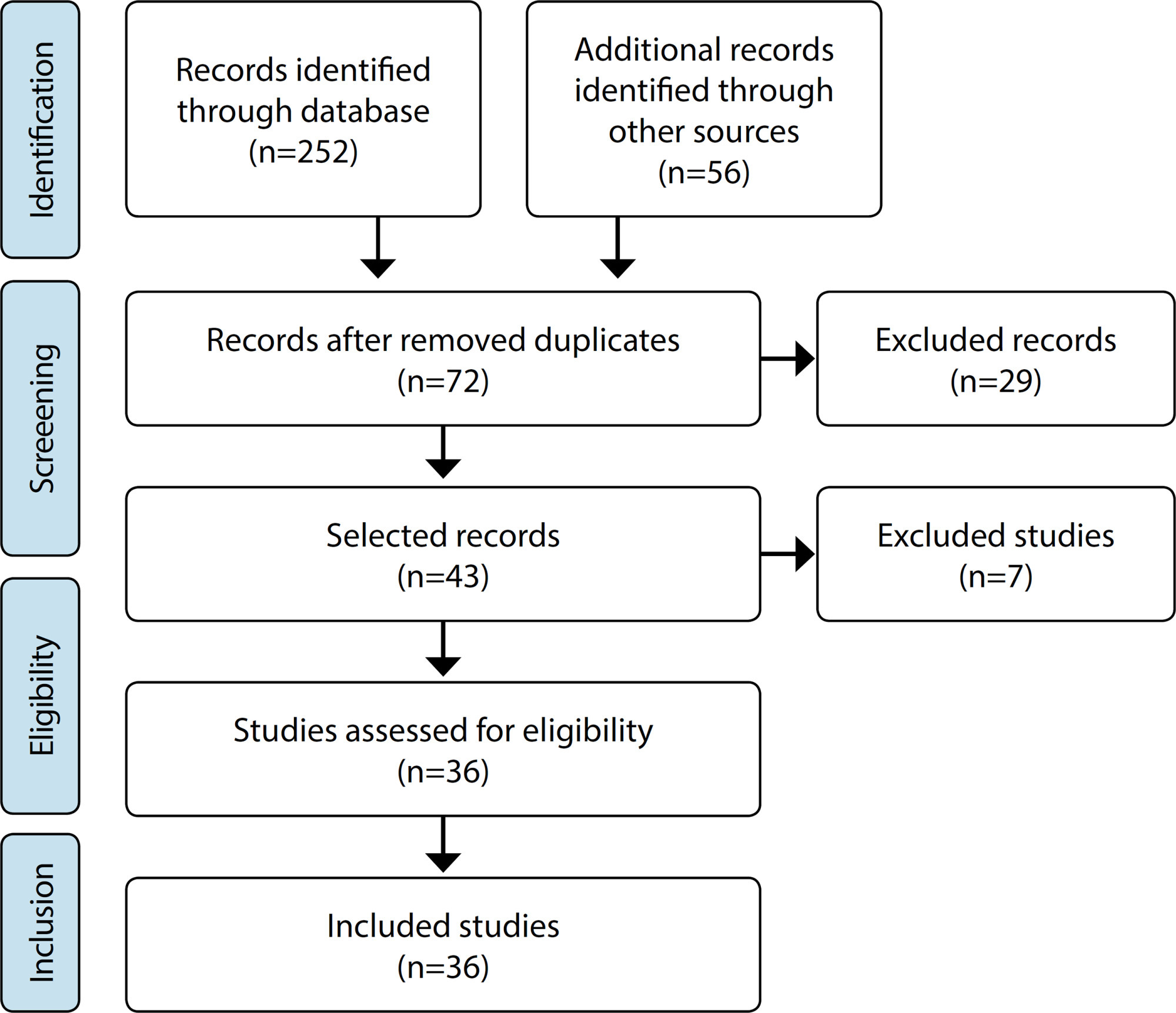
-
ORIGINAL ARTICLE03-07-2022
Adaptation and validation of the Advanced Practice Nursing Competency Assessment Instrument
Revista Brasileira de Enfermagem. 2022;75(5):e20210582
Abstract
ORIGINAL ARTICLEAdaptation and validation of the Advanced Practice Nursing Competency Assessment Instrument
Revista Brasileira de Enfermagem. 2022;75(5):e20210582
DOI 10.1590/0034-7167-2021-0582
Views0See moreABSTRACT
Objective:
To adapt and validate the content of the Advanced Practice Nursing Competency Assessment Instrument (APNCAI) to Brazilian culture.
Methods:
This is a methodological study that followed the stages of translation, synthesis, back translation, evaluation by a committee of five specialists, pre-test with 31 nurses, and evaluation by the author of the original instrument. The Content Validity Index (minimum 0.90) and the modified Kappa (minimum 0.74) were calculated to evaluate the content.
Result:
In the first round of content evaluation, 18 items had to be altered because they did not reach the minimum values established. Three items have not reached a consensus in the second round and had to be sent to the author of the original version. In the pre-test, 13 items were returned to the specialists because they suffered content changes.
Conclusion:
The Advanced Practice Nursing Competency Assessment Instrument (APNCAI) – Brazilian version was cross-culturally adapted, and its content was validated.
-
ORIGINAL ARTICLE09-21-2020
Anxiety and depression in informal caregivers of dependent elderly people: an analytical study
Revista Brasileira de Enfermagem. 2020;73:e20190851
Abstract
ORIGINAL ARTICLEAnxiety and depression in informal caregivers of dependent elderly people: an analytical study
Revista Brasileira de Enfermagem. 2020;73:e20190851
DOI 10.1590/0034-7167-2019-0851
Views0See moreABSTRACT
Objective:
To analyze the symptoms of anxiety and depression in informal caregivers of dependent elderly at home.
Methods:
Analytical, cross-sectional study conducted in the city of Teresina (PI), with informal caregivers of dependent elderly people. Data collection took place from November 2017 to February 2018, using a characterization form for the dependent elderly and their caregiver, Beck’s Anxiety Inventory (BAI) and Beck’s Depression Inventory (BDI). The forward linear regression model was used to identify the predictive variables of anxiety and depression.
Results:
It was found that 18.4% of caregivers had symptoms of depression; and 14%, moderate to severe anxiety. There was a correlation between anxiety and depression (p = 0.000).
Conclusion:
The findings of this study make it possible to assess anxiety and depression in caregivers of dependent elderly people, making it possible, through these parameters, to view the profile and care demands of this population.
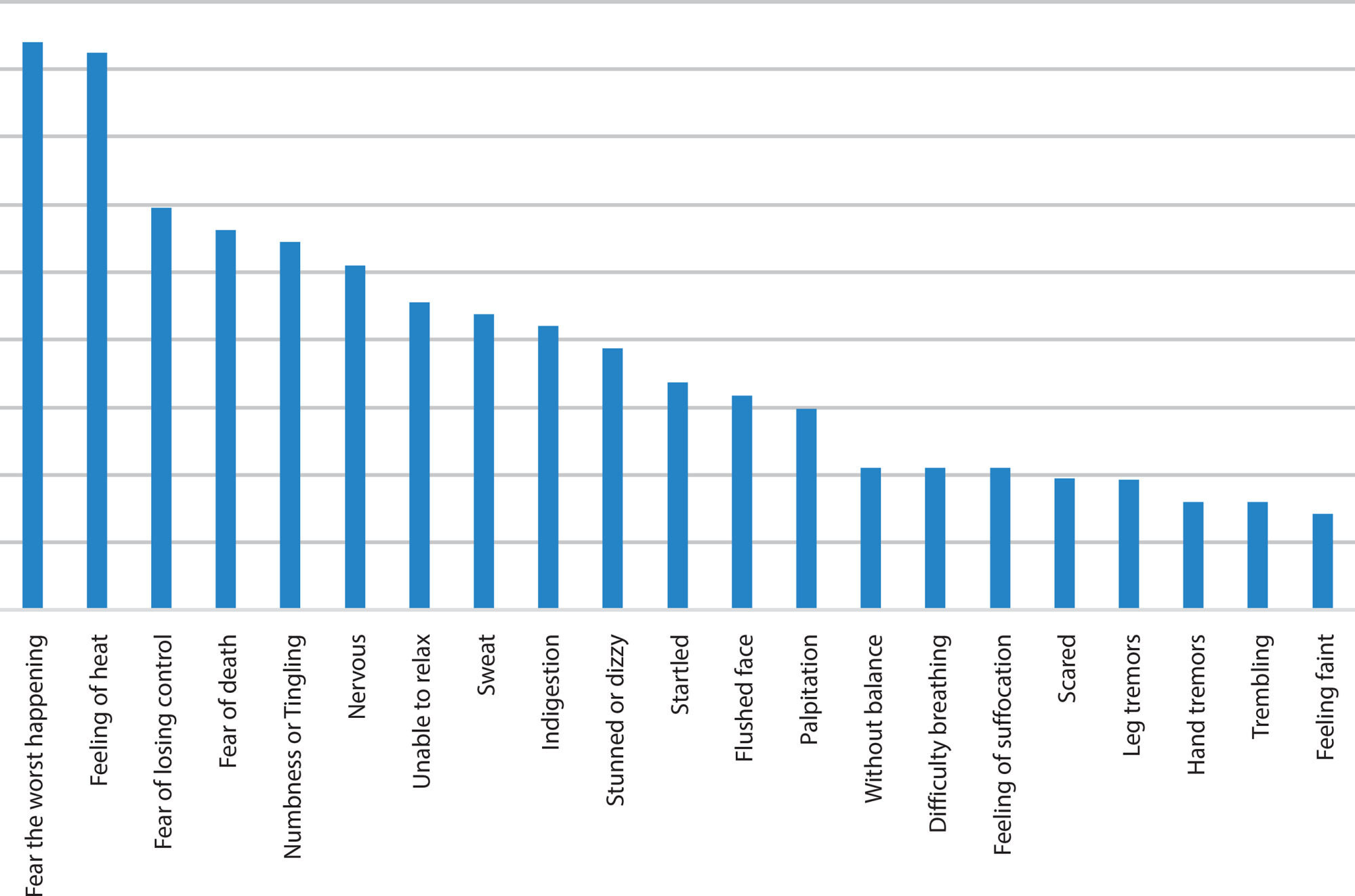
Search
Search in:
Nuvem de Tags
Adolescente (85) Atenção Primária à Saúde (239) COVID-19 (91) Criança (91) Cuidados de Enfermagem (269) Educação em Enfermagem (151) Educação em Saúde (139) Enfermagem (930) Enfermagem Pediátrica (86) Estudantes de Enfermagem (77) Estudos de Validação (131) Família (87) Idoso (208) Promoção da Saúde (99) Qualidade de Vida (104) Saúde do Trabalhador (86) Saúde Mental (145) Saúde Pública (82) Segurança do Paciente (150) Tecnologia Educacional (100)



